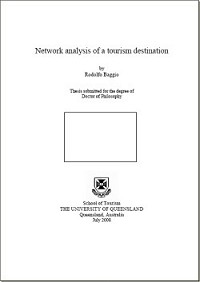|
| Turismo | IT & Internet | Pagine Sparse | Astronomia | Curriculum |
Download (pdf file) - Warning: LARGE (6MB) file) Abstract The nature of development and evolution of a tourism destination has profound implications not only for public authorities, as an aid in control and planning, but also for all the destination stakeholders. A tourism destination is analysed here as a dynamic evolving complex system with the series of techniques and methods drawn from the area of network analysis. Recent research has shown that the topology of a network has predictable properties that may greatly affect the overall dynamic behaviour and explain and influence a number of processes from the diffusion of ideas to robustness to external attacks and the optimisation of the relationships among the network components. These analysis techniques can be considered a diagnostic method for collecting and analysing data about the patterns of relationships among people in groups or among organisations. They provide a view into the network of relationships that may give tourism organisation managers a strong leverage to improve the flow of information and to target opportunities where this flow may have the most impact on regulatory or business activities. The main objective of this thesis is to apply methods and techniques of so called ‘network science’ in order to study the evolution of the destination system and to simulate dynamic processes such as information and knowledge diffusion, and efficiency optimisation. The first part of the thesis concerns the theoretical background for this work. The most recent results of the investigations on network theories are reviewed. Both static and dynamic characteristics of a network and of the main processes which may occur (robustness with respect to external or internal shocks and diffusion of knowledge and information) are discussed. The models and the metrics presented have been chosen from the larger literature on the subject based upon their recognised importance for the assessment of the structural characteristics of a network, or because they are deemed particularly suited for the objectives of this study. The tourism destination is then discussed as a peculiar form of industrial district. Industrial economics are presented together with the main issues on the structure and the evolution of a cluster of firms. In this framework the characteristics of a tourism destination are examined and the current ideas on its possible evolutionary growth are taken into account. These discussions set the composite and multidisciplinary theoretical framework for this thesis. A specific methodology for the study conducted is then presented. The methodology chapter contains the account of the reasons for the choice of the test case: the island of Elba, Italy. Furthermore it reports on the issues related to the collection of the data needed and their assessment from a completeness and reliability point of view. Two networks are built: the network of relationships between the tourism stakeholders and one of the hyperlinks among their websites. Specific algorithms and measurement techniques for the main static and dynamic characteristics of the destination network are detailed. The results of the study are then presented. They concern the measurement of the topological features of both networks (the real and the virtual) and the comparison between them. A simulation study then allows the robustness of the system and its responses to the process of diffusion of knowledge and information to be examined. The simulation also allows the influence of possible modifications in the network topology on these processes to be determined. A reconstruction of the past structure of the destination is finally used to compare network characteristics at different times. This comparison is employed to present a model of destination evolution based on its dynamic network topology. The last part of the thesis contains the discussion of the results. Their interpretation is presented first from a ‘network science’ viewpoint. The implications of this interpretation for the management of the destination are discussed by highlighting the contribution of this work for the scholarly study of the subject and by providing insights into the possible usage of the methodology by practitioners (destination managers or single stakeholders). Keywords: tourism destinations, economic and social integration, socio-economic systems, complex systems, network analysis.
|

